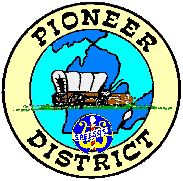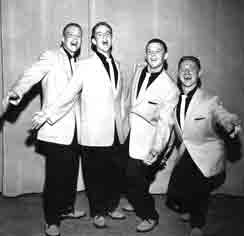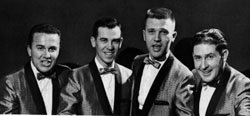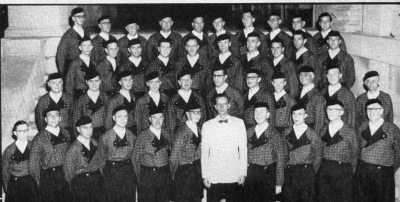


1954 began with debates and sagging membership
The Society's midwinter convention took place in Minneapolis, Minnesota, on January 15-17, 1955, amid a cold wave which took temperatures to minus 23 degrees. Inside the Nicollet Hotel, however, it heated up as the Board changed the fiscal year so it would run from January 1 through December 31. At the same time, in order to make this change work, the dues-paying options were introduced, which involved six-month and eighteen-month options. At any rate, this change and the direct mailing of invoices to chapter members with explanations along with the changing of the 90-day late payment waiver to 30 days created quite a furor, particularly in the Michigan District. Bitter opposition to the proposals were voiced by the Dearborn and the Ann Arbor chapters, which, in the long run, were to no avail. This opposition carried over to the Michigan House of Delegates meeting, but after an extensive session was finally over, the only proposal passed by the assembled delegates was that membership cards of SPEBSQSA be changed as of Jan. 1, 1956, so as to designate the member's chapter affiliation and that space be provided thereon for the appropriate chapter officer's signature.
 Lou Harrington |
 Loton Wilson |
The annual meeting of the Michigan District was held on Sunday morning, May 16, 1955, at the University of Michigan Union in Ann Arbor. Secretary Lou Harrington reported that as of April 30, 1955, the district had 51 chapters and 1,717 members, a far cry from five to ten years before. The election of officers was held and Loton Willson of Boyne City was elected president; Don Wright of Hudson, first vice president; Seaborn Lawrence, second vice president; Tom Grove of Dowagiac, third vice president (a newly created position voted on at the previous meeting in Manistee on October 12, 1952); Jack Klaiber of Grand Rapids, treasurer, and Lou Harrington, secretary. Howard Tubbs of the Detroit Chapter then recommended, after considerable study by his committee, a two-percent sanction fee be put on chapter parades to help finance the district treasury. A motion was made and passed that a two-percent sanction fee on gross ticket sales of all chapter parades, shows and functions on which proceeds go to the chapter treasury, be enacted. It was felt that this was more than offset by the exemption from the 20 percent Federal tax on admissions obtained earlier. International President Berney Simner addressed the delegates as the keynote speaker.
Committee set up to bolster sagging membership
Under the auspices of John Hill, a veteran Lansing Chapter member, a Study Committee was set up to begin work to plan ways and means to bolster the sagging membership of the Michigan District. "What we need, I feel, is a properly directed effort to find out what is wrong, why members have lost interest, and then find ways of getting them back, make them interested again and keep them that way. I want this committee to be made up of volunteers. I don't want them appointed", Hill said, in making the proposal. Interesting, from an historical point of view, that this theme has been a perennial problem throughout the history of our Society; and it is a problem we are still faced with today.
Ann Arbor welcomed June international preliminary contest
 Wolverines |
 Merri Men |
In the international preliminary contest held in Ann Arbor that weekend, eight quartets vied for the honor of representing the district at the upcoming international contest to be held in Washington, D.C. on June 9-12, 1955. The Michigan BEL-AIRES of the Grosse Pointe and Northwest chapters (Gordon Limburg, tenor; Bob Burrell, lead; John Zinnikas, bass, and Dick Den Broeder, bari), the PITCHBLENDAIRES (Pollard, Clixby, Dan Golding, Don Golding) and the WOLVERINES (Al Rehkop, tenor; Joe Sipot, lead; Glen Van Tassell, bari, and Ray Sipot, bass) of the Detroit Chapter were chosen as the three representatives, with the ONCHORDS of Saginaw as alternates. Other quartets competing were the AIRE-TONICS of Muskegon, the MERRI-MEN of Lansing, the SOLITAIRES of Bay City and the DEBONAIRES from Ann Arbor. All of the competitors gave particular attention to costuming in both sessions. The lack of quartets was particularly disturbing to many observers at the time. The FOR-TUNE TELLERS of Jackson and the KEY WANDERERS of Hudson had signed up but failed to appear. The CLEF DWELLERS had announced earlier in the year that they were disbanding due to the pressure of business commitments, and in many people's minds, that left Michigan without a seasoned or viable quartet to take the international crown.
Detroit #1 Chapter sponsors first "Chorus College" for novice choruses
A unique innovation sprouted with the "Chorus College" put on by the Detroit Chapter on May 25, 1955, for novice choruses. It was a contest followed by a clinic patterned after the successful quartet clinics that had been held in the Michigan District. The winner of the contest was Dearborn's Chapter chorus under the auspices of Arnie Oakman. A field of four competed, Northwest Detroit, East Detroit, and Jackson. Judges were Ed Smith, chairman, arrangement; John Hill, harmony accuracy; Mark Roberts, voice expression; Henry Schubert, stage presence; Bob Montgomery was secretary with Al Singer and Tom Needham as timers. Detroit's PRECISIONAIRES acted as hosts. Proceeds went to the Detroit chorus as an aid to their Washington expenses. Chuck Osburn was chairman and Howard Tubbs, master of ceremonies.
At the international convention and contests held in Washington, D.C. on June 9-12, the Michigan quartets and two choruses were shutout of any medals. The chorus contest was won by the SINGING CAPITOL Chorus of Washington, D.C. followed closely by Rudy Hart's MICHIGAN CITY Chorus of Michigan City, Indiana. In the quartet contest, the ORPHANS of Wichita, Kansas were winners of the international quartet championship for 1955.
One interesting incident occurred on Thursday evening, June 10, of the convention week. Hundreds of barbershoppers and their families were preparing to depart from the Hotel Statler for the Quartet Finals at Constitution Hall. A short while before, Lou Harrington, secretary of the Michigan District, was informed that the Eisenhowers were due to arrive at the hotel at 7:55 p.m. for a dinner meeting given by the Citizens for Eisenhower organization.
As the Harmonizer explained it, "Harrington, sensing that here was a striking opportunity for the President to meet barbershopping and for barbershopping to meet the President, did some quick thinking. Lou hurriedly contacted Jerry Larkins, president of the Dearborn, Michigan Chapter, and Mike Egan, spokesman for the FOUR TEENS. Harrington asked Larkins to go upstairs into the mezzanine floor and there organize a barbershop chorus which would sing from the stairs and the mezzanine balcony overlooking the entrance below. Egan was given the job of organizing a barbershop group on the lobby floor. Warren "Buzz" Haeger, director of the Skokie Valley Chorus, was drafted to direct the giant assembly.
"Harrington, standing at the entrance, saw the Presidential party drive up outside with flags flying and sirens wailing. As President and Mrs. Eisenhower alighted from their automobile, a pitch pipe sounded. There was a sudden stillness. The huge plate glass doors opened and as the President and Mrs. Eisenhower stepped through the doorway, some 300 barbershoppers let loose with `Keep America Singing' in perfect pitch. The President stopped, bewildered. But Mrs. Eisenhower quickly smiled and the President immediately followed her example.
"There stood the Presidential pair, listening to barbershop harmony. As they remained motionless so did the rest of their party. Citizens for Eisenhower dignitaries, secret servicemen and presidential aides were all caught off guard. One aide stepped close to the President and asked if perhaps the party should proceed up the stairs to the important dinner meeting. The President replied graciously that no, he and Mrs. Eisenhower would wait here and listen until the song was finished. When the song ended the President and the First Lady, waved and moved upstairs." A letter signed by President Eisenhower was later sent to Society thanking them for this presentation.
"Pitchblendaires" take district crown at Muskegon
 Windmill Chorus 54 |
The Muskegon Chapter hosted the Michigan District contest on October 8-10, 1955. The new district champs crowned were the PITCHBLENDAIRES from Detroit (J. Golding, Clixby, D. Golding and Pollard). Second place went to the ONCHORDS of Saginaw with the AIRE-TONICS of Muskegon taking third place. In the chorus contest, the Holland WINDMILL Chorus with Francis Hodgeboom directing took the district honors.
The district meeting adopted a resolution to set up a committee to adopt a district song, and the formation of six areas to produce barbershop functions. One of the small chapters in the district—Gratiot County—entered four quartets and a chorus in the contest.
At the end of December, 1954, the district membership count stood at 1645 members. Three chapters boasted over 100 members including Muskegon at 127, Detroit and Dearborn at 124 each.
| [index] | [1951] | [1952] | [1953] | [1954] | [1955] | [Contents] |